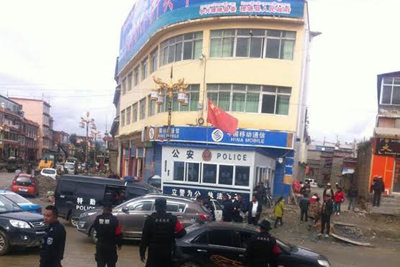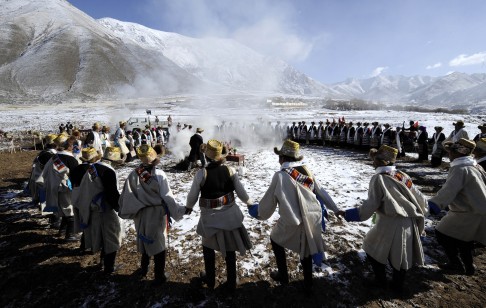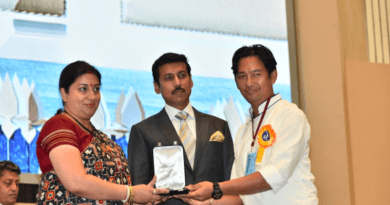Tibet under new crackdown campaign ahead of 50th founding anniversary celebrations of TAR
DHARAMSALA, Aug 20: The preparations for the celebration of 50th founding anniversary of Tibet Autonomous Region (TAR) have worsened an already deteriorating human rights situation in Tibet, a Tibetan rights group based in Daharamsala said in a release, adding that with the anniversary celebrations, China is hoping to hoodwink the international community, which has begun to pay more attention to Tibet since the 2008 mass uprising.
According to Tibetan Centre for Human Rights and Democracy (TCHRD), Chinese authorities have begun implementing a campaign called ‘Clean Sweep and Strike’ (Ch: da jian cha) in preparation for the anniversary celebrations, ostensibly to provide security to postal activities.
“Under this campaign, the TAR authorities will monitor and surveil postal exchanges between Beijing and TAR, and monitor and prohibit arms and ammunitions, knives, explosives, including dangerous chemicals, and also leaflets and other political publications. Even remote-controlled toys such as miniature planes will be banned from flying particularly in the urban skyscape,” TCHRD said.
The State Post Bureau of the People’s Republic of China (PRC) has sent an official circular on Aug 11, 2015 to provincial, regional, and township bureaus to maintain strict control over all channels of communication.
According to the circular published on the website of the PRC’s State Post Bureau: “All communication materials including speed posts sent from TAR to Beijing between 20 August to 5 September, and all letters and communication materials sent from Beijing to TAR between 20 August to 12 September will pass through officials responsible for investigating them. All these communication materials should be thoroughly searched, monitored and controlled. The real names and addresses of the senders and receivers of these postal materials should be registered and investigated. Various organs of the government should also establish small postal security bureaus to ensure the security of communication and materials. All officials, by turn, should conduct a 24-hour search and monitoring of the communication materials. In the event of any unexpected incidents, they should report it in a timely manner; moreover, detailed control mechanism or laws should be adopted, and forwarded to the heads of the postal bureaus and those responsible for Internet control, who must be made responsible for the security of communication channels and materials by taking their signatures on a document. In short, measures of control should be efficiently implemented, as directed by the government.”
The Chinese government projects the anniversary celebrations, being planned in seven areas and towns of TAR, as evidence of ethnic autonomy in Tibet and the protection of the minority nationalities’ right to preserve and promote their unique language, culture, religion and way of life.
Wu Yingjie, the TAR vice party secretary, on being appointed the deputy chairman of the organizing committee of TAR said, “Through these celebrations, we must clearly point out the great achievements that have come out of the implementation of the Regional Ethnic autonomy laws, including the achievements of the Tibetan people in matters of self rule.”
During the third session of the 12th conference of the National People’s Congress (NPC) held from 3 to 5 August 2015, Chinese Premier Li Keqiang announced the decision to mark the 50th founding anniversary of TAR.
Prior to Li’s announcement, an organizing committee formed by the central government of the PRC and the Chinese Central Propaganda Department convened a meeting on Aug 1, 2015 where state media such as the China National Radio, China International Radio, China Central Television (CCTV), media organs of the Central Propaganda Department, and the publicity organs of the TAR Communist Party submitted proposals on [covering] the propaganda spectacles.
Cui Yuying, deputy minister of the Propaganda Department and deputy director of Information Office of the State Council, said, “We should carry out a sophisticated, systematic, free-flowing publicity campaigns that will create an image of a harmonious and stable Tibet within the country and abroad.”
Restrictions have been placed on foreign travelers to Tibet with the TAR Tourism Bureau rejecting applications for visits in September.
“Travel permits are still being denied to travelers from Norway, Nigeria and Philippines. Although places in TAR such as Lhasa and other surrounding prefectures and counties remain sporadically open to foreign travelers, some areas, which witness frequent protests against the Chinese authorities, have remained closed for years. All of Chamdo (Ch: Changdu) except for Rawok Lake – 8 kms inside Chamdo – has been closed to foreign tourists since 2008. Other areas closed in TAR include some counties in Nagchu (Ch: Naqu) Prefecture. The sacred Lhamo Lhatso Lake remains closed for unknown reasons,” TCHRD said in its release.
PRC established the Tibet Autonomous Region (TAR) on Sep 1, 1965.
On Mar 28, 1959 the so-called Preparatory Committee for TAR was formed and in order to showcase a semblance of legitimacy, China appointed the late 10th Panchen Lama as the chairman of the committee. Ironically, in 1965, the year TAR was formed; Panchen Lama was arrested for “opposing socialism and masses” and “instigating rebellion.”





